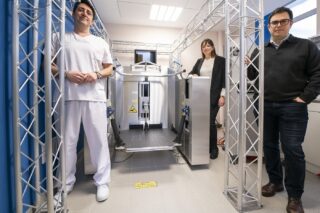AI-powered medical imaging technologies are revolutionizing healthcare by enhancing diagnostic accuracy, treatment efficacy, and patient care across various disciplines.
AI’s transformative impact on medical imaging is reshaping the landscape of disease detection, ensuring no illness goes unnoticed. Across the globe, advancements in artificial intelligence are revolutionizing healthcare, particularly in diagnostic precision and treatment efficacy. This evolution marks a significant shift towards intelligent healthcare solutions, integrating AI seamlessly into medical practices.
From enhanced telemedicine capabilities to AI-driven diagnostics and cloud-based data analytics, these innovations are poised to optimize patient care and resource allocation. This paradigm shift underscores AI’s pivotal role in the future of medicine, promising to uncover new possibilities for improving global healthcare outcomes.
This evolution was prominently displayed at the 89th China International Medical Equipment Fair (CMEF) in Shanghai last April, themed “Innovative Technology, Leading the Future.” Here, we noted that exhibitors seized the opportunity to showcase cutting-edge internet-based technologies and AI-infused products, marking a pivotal moment in the convergence of AI and healthcare innovation. It was an unprecedented feast of ‘AI+’ and ‘Internet+’ medical technology.
AI in Healthcare: From Precision Surgery to Personalized Diagnostics and Treatment
AI-assisted diagnostic systems utilize deep learning technology to identify and quantify lesions. In operating rooms, intelligent robots leverage AI algorithms for precise navigation, assisting doctors in performing complex minimally invasive surgeries. Moreover, intelligent triage and mobile healthcare services have been comprehensively upgraded, providing patients with more convenient and personalized medical experiences. The application and potential of AI in enhancing healthcare service efficiency, optimizing diagnostic and treatment processes, and achieving personalized and precise medical care are realized through various AI software and technologies.
The main applications of medical AI include disease diagnosis and prediction, new drug development, health management, and medical imaging. Among these, the application of AI in medical imaging is more widespread, encompassing CT, MRI, ultrasound, pathology, endoscopy, and fundus imaging. Consequently, the industry related to the processing of medical imaging data is highly sought after in the market.

Medical image recognition has become another application scenario where artificial intelligence can be precisely adapted, following autonomous driving and facial recognition. Nowadays, many hospitals are incorporating AI technology into the field of medical imaging. For patients, the first ‘reader’ of a CT scan might not be a radiologist but an AI robot that has undergone specialized ‘training’.”
By learning from hundreds of thousands of CT reports, AI has become an experienced digital ‘doctor’ in identifying certain diseases, capable of precisely detecting the smallest lesions. Upon discovering a suspected case, the system automatically identifies the suspicious area and calculates the proportion of the lesion within the anatomical structure, providing doctors with detailed quantitative data to assist further decision-making. AI not only enhances doctors’ work efficiency but also enables precise treatment. However, its limitations are also evident, as it still cannot fully replace the role of human doctors.
Advancements in AI Medical Imaging: Innovations and Integration Across Disciplines
The rapid evolution of AI technology in medical imaging has catalyzed innovations across radiology, ultrasonography, nuclear medicine, and interventional radiology, transforming the landscape of precision medicine. During our tour of the fair, we discovered a variety of AI medical products and recognized the integration of AI into these four major disciplines of medical imaging. At the CMEF, several pioneering companies unveiled cutting-edge AI-powered solutions revolutionizing diagnostic accuracy and treatment efficacy in healthcare.
Shukun Technology’s Digital Doctor Platform encompasses intelligent imaging for cardiovascular, cerebrovascular, pulmonary, liver, and musculoskeletal conditions, leveraging CT, MRI, DR, ultrasound, and DSA modalities. It integrates intelligent part recognition, precise quality control, and multi-site joint diagnosis, facilitating new intelligent workflows for doctors and achieving high-precision navigation throughout disease processes.


Deepwise’s Dr. Wise® AI-assisted system offers a spectrum of solutions including comprehensive pulmonary care, breast cancer detection, growth assessment, stroke diagnosis, and coronary CTA. Utilizing AI, the system automates lesion detection, quantitative analysis, and structured reporting for chest CT, significantly enhancing diagnostic efficiency across these medical domains. With its wide-ranging diagnostic capabilities, Dr. Wise® represents a significant advancement in medical imaging technology.

United Imaging’s medical imaging software provides a comprehensive AI platform that spans all modalities and incorporates multidimensional advanced clinical applications, empowering precise clinical diagnosis. With over 60 advanced applications, United Imaging empowers clinicians with efficient, accurate diagnostic tools for diverse clinical challenges.


The integration of AI into medical imaging represents a transformative leap forward in healthcare, promising unparalleled advancements in disease detection and treatment. As AI technologies continue to evolve, they enhance diagnostic precision, streamline treatment protocols, and improve patient outcomes on a global scale. The CMEF underscored the rapid pace of innovation in AI-powered medical solutions, highlighting their pivotal role in shaping the future of medicine. With ongoing developments in AI-driven diagnostics and treatment planning, we anticipate continued improvements in healthcare efficiency and effectiveness, marking a new era of personalized and precise medical care fueled by artificial intelligence.











